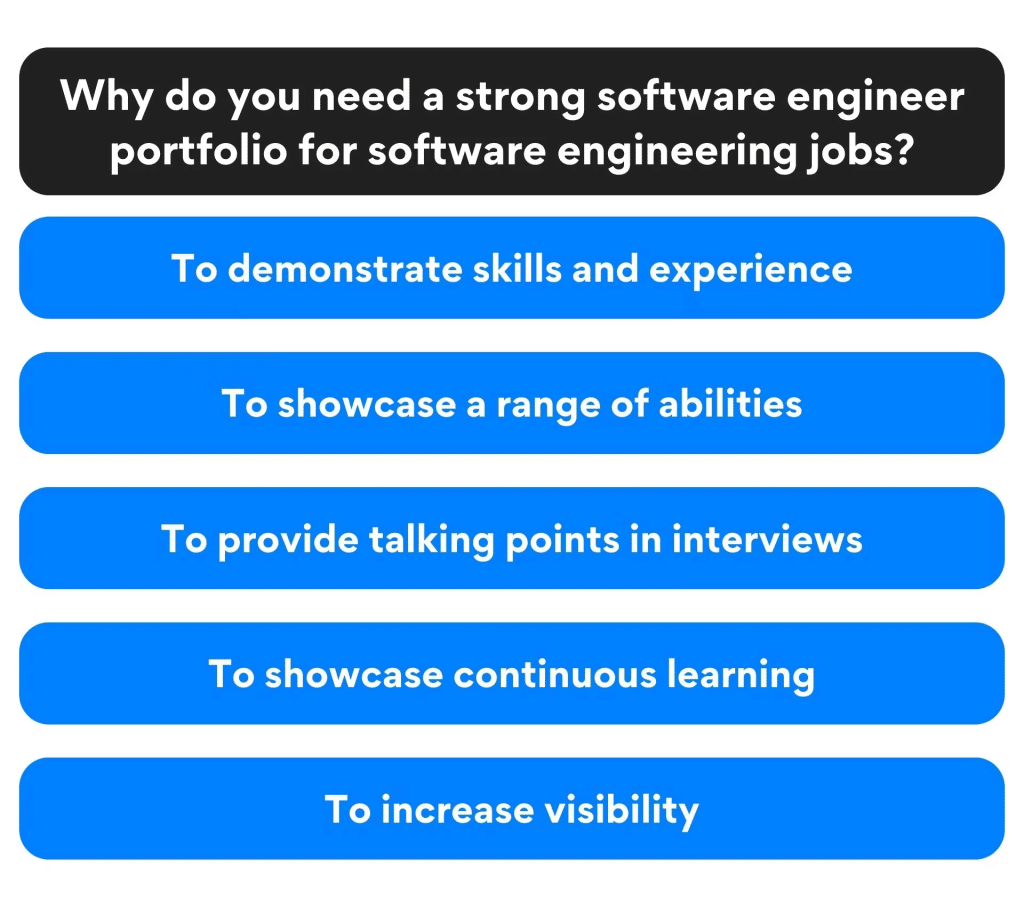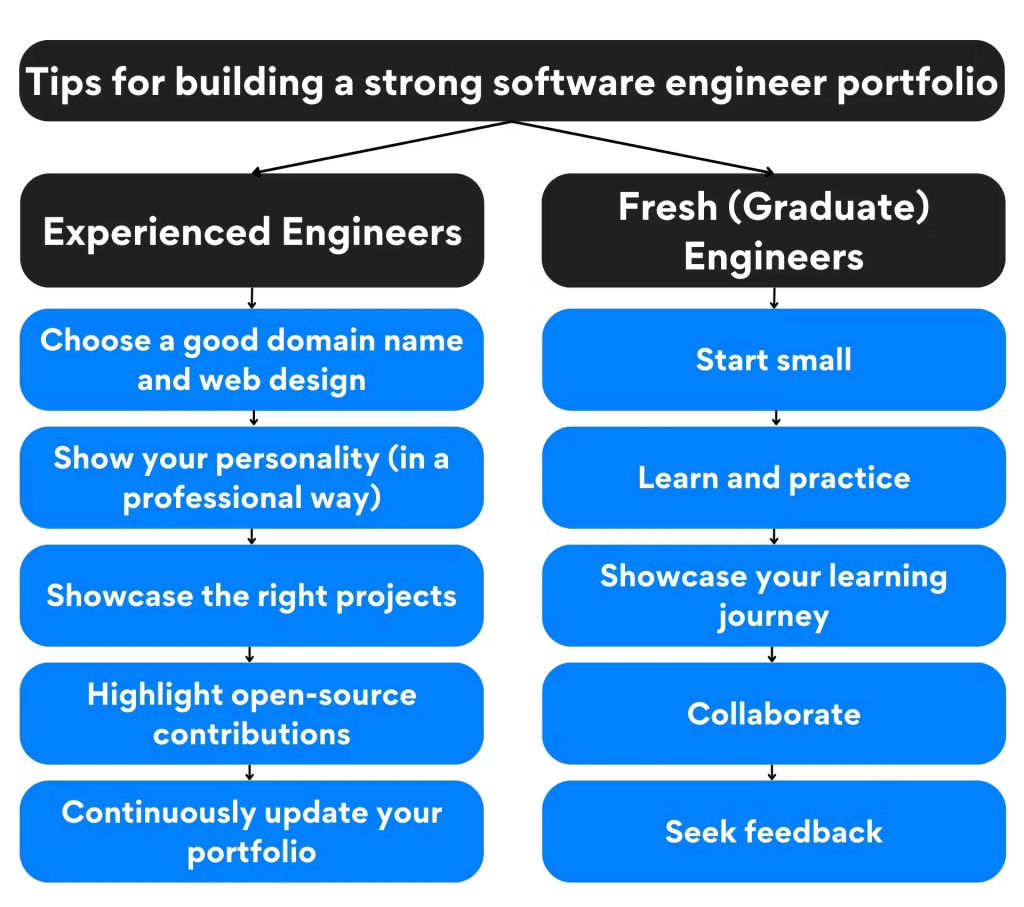A software engineer portfolio is your secret weapon in the tech job hunt. It’s a curated collection of projects and accomplishments that showcase your skills, experience, and potential to employers. Think of it as your personal highlight reel, proving you’ve got the coding chops and problem-solving prowess to excel in the field.
This blog post will explore why a strong portfolio is non-negotiable for aspiring software engineers and provide ten actionable tips to make yours shine. Whether you’re an experienced developer or a recent graduate, these strategies will help you craft a portfolio that captures attention and opens doors to exciting opportunities.
Why You Need a Strong Software Engineer Portfolio

Source: Turing
In the competitive tech landscape, a strong portfolio can be the deciding factor between you and another qualified candidate. Here’s why:
- Demonstrates Skills and Experience: A portfolio provides tangible evidence of your abilities. It allows employers to go beyond your resume and see your coding style, problem-solving approach, and the quality of your work firsthand.
- Showcases a Range of Abilities: A well-rounded portfolio can highlight your versatility by featuring projects that utilize different technologies, methodologies, and demonstrate various aspects of software development.
- Provides Talking Points in Interviews: Your portfolio serves as a springboard for engaging interview conversations. You can walk interviewers through your projects, explaining your thought process, challenges faced, and lessons learned.
- Showcases Continuous Learning: Regularly updating your portfolio with new projects and skills demonstrates your commitment to staying ahead of the curve in the ever-evolving tech world.
- Increases Visibility: A public portfolio, especially when hosted online, increases your visibility to potential employers actively searching for talent.
10 Tips for a Stellar Software Engineering Portfolio

Source: Turing
Tips for Experienced Software Engineers
- Choose a Good Domain Name and Web Design: Your portfolio website is your digital storefront. Make a strong first impression with a professional domain name and clean, user-friendly design. Consider using platforms like GitHub Pages or WordPress to create a polished and easily navigable website.
- Show Your Personality (Professionally): Let your personality shine through while maintaining a professional tone. Share your passions, career goals, and what makes you unique as a software engineer. Injecting personality makes your portfolio more memorable and helps employers connect with you on a personal level.
- Showcase the Right Projects: Select projects that highlight your skills and align with your desired career path. Provide clear descriptions, highlight technical challenges overcome, and include screenshots or links to live demos whenever possible.
- Highlight Open-Source Contributions: Participation in open-source projects demonstrates your collaborative spirit and passion for software development. Include links to your contributions on platforms like GitHub and explain your role and impact.
- Continuously Update Your Portfolio: A stagnant portfolio can raise red flags. Regularly update it with new projects, skills, and accomplishments to showcase your ongoing growth and commitment to staying current.
Tips for Fresh (Graduate) Software Engineers
- Start Small: Don’t feel pressured to create complex projects right away. Focus on smaller projects that demonstrate your understanding of fundamental concepts and gradually work your way up to more challenging endeavors.
- Learn and Practice: Embrace continuous learning and practice by participating in coding challenges, hackathons, and online coding platforms like HackerRank or LeetCode. These activities help you hone your skills and build a portfolio simultaneously.
- Showcase Your Learning Journey: Document your learning progress by sharing your experiences with online courses, tutorials, and personal projects on platforms like LinkedIn or a personal blog. Highlighting your journey demonstrates your eagerness to learn and grow.
- Collaborate: Collaborating on projects, even small ones, provides valuable experience in teamwork, version control, and communication – all essential skills in software development. Seek opportunities to collaborate on open-source projects or team up with fellow developers.
- Seek Feedback: Don’t be afraid to share your work and ask for constructive criticism from mentors, peers, or online communities. Feedback helps you identify areas for improvement and refine your skills.
Conclusion
A strong software engineer portfolio is your key to unlocking exciting opportunities in the tech industry. By following these tips, you can create a portfolio that effectively showcases your skills, experience, and potential to potential employers. Remember to tailor your portfolio to your target audience, highlight your strengths, and continuously update it to reflect your growth as a software engineer.
Ready to Take Your Software Engineering Skills to the Next Level?
At Melsoft Academy, we offer intensive software engineering bootcamps designed to equip you with the in-demand skills and industry knowledge needed to thrive in the tech world.
Our immersive curriculum, experienced instructors, and career support services will empower you to build an impressive portfolio and launch a successful career in software engineering.



Saved aas a favorite, I like your web site! https://Lvivforum.Pp.ua